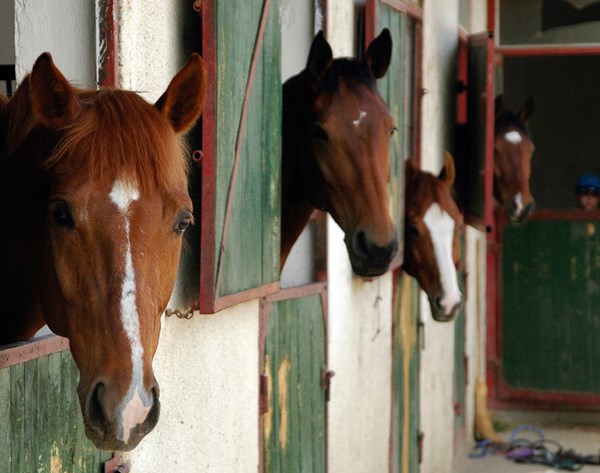 Credit: Thinkstock Risk factors include, but are not limited to, diets high in fermentable carbohydrates, feed deprivation, non-steroidal anti-inflammatory medications (NSAIDs, such as Bute or Banamine), lack of paddock or pasture turnout (confinement has been associated with increased natural corticosteroid release), and exercise schedule.
Credit: Thinkstock Risk factors include, but are not limited to, diets high in fermentable carbohydrates, feed deprivation, non-steroidal anti-inflammatory medications (NSAIDs, such as Bute or Banamine), lack of paddock or pasture turnout (confinement has been associated with increased natural corticosteroid release), and exercise schedule.Gastric ulceration in horses is known as equine gastric ulcer syndrome (EGUS). This syndrome is considered a multifactor disease because there are a plethora of risk factors that have been associated with gastric ulceration.
Studies have demonstrated that greater than 80% of racehorses have been documented as having stomach ulcers during their training and racing careers. Risk factors include, but are not limited to, diets high in fermentable carbohydrates, feed deprivation, non-steroidal anti-inflammatory medications (NSAIDs, such as Bute or Banamine), lack of paddock or pasture turnout (confinement has been associated with increased natural corticosteroid release), and exercise schedule.
Unlike in humans, the bacteria Helicobacter pylori has not been definitively associated with EGUS.
Clinical signs in horses may include acute or recurrent colic, poor body score condition, decreased appetite (especially for grain), poor performance, grinding of teeth, recurrent impactions, and changes in the animal’s attitude.
The diagnosis of the disease is based on clinical signs, endoscopic examination, and response to treatment.
Endoscopic examination is used to help determine the presence of ulceration, location and severity of the ulceration, and the response to treatment. Location of the ulceration can help determine the factors associated with the disease.
For example, an ulcer located in the region of the pylorus (the portion of the stomach that connects it to the small intestine) could be associated with the use of NSAIDS.
Treatment consists of the use of an FDA-approved omeprazole product (Gastroguard or Ulcerguard made by Merial, for example), Carafate, or histamine type 2 receptor antagonist (Cimetidine or Ranitidine).
A recent veterinary study has shown that compounded omeprazole products are not as effective as the commercially available FDA-approved product in the healing of gastric ulcers in Thoroughbred racehorses. It therefore is very important to make sure that if your horse(s) require treatment for EGUS, they are prescribed the FDA-approved omeprazole product and not a compounded omeprazole product.
The author of this article was Nathan Marc Slovis, DVM, is the director of the McGee Medical and Critical Care Center at the Hagyard Equine Medical Institute in Lexington, Kentucky.


